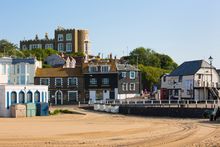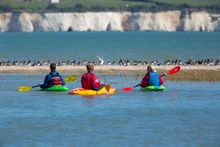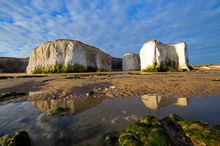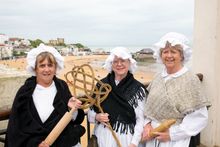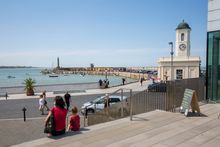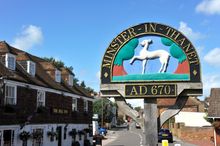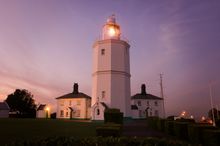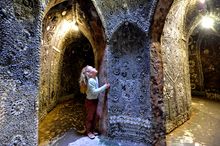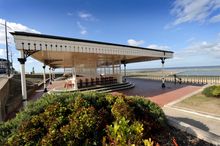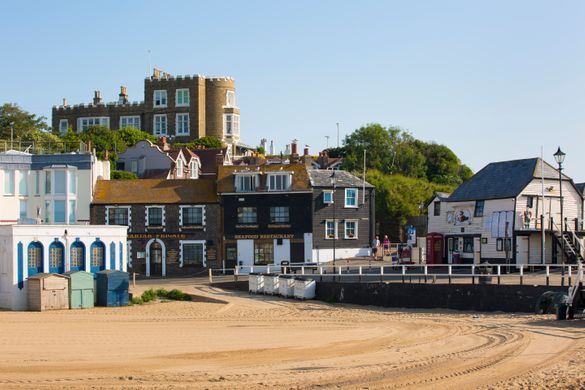 10 Feb 2017
10 Feb 2017
Jane Austen sensed a loosening of social proprieties; Charles Dickens enjoyed “the freshest, freest place”; TS Eliot overcame writer's block; John Buchan found the title for his most famous thriller. The Georgian and Victorian resorts of Margate, Broadstairs and Ramsgate, their chalk cliffs and smugglers' bays have long inspired writers. So come and celebrate Thanet's creative coast in VisitEngland's year of Literary Heroes.
Regency Ramsgate with Jane Austen
As we mark the 200th anniversary of the death of Jane Austen (1775–1817), her world of fluttering hearts and heroines set on advantageous marriages may seem a world away. But you can step right back into it in Georgian and Regency Ramsgate. The novelist visited in 1803 when it was a garrison town during the Napoleonic wars and her beloved brother Francis led the Sea Fencibles set up to repel invasion. Jane was also eager to meet her future sister-in-law, local girl Mary Gibson – the “lovely couple, side by side” wed in 1806, as celebrated in Jane's poem, 'Post Haste From Thanet'.
Today you will find Ramsgate Royal Harbour – the only Royal Harbour in the country – alive with cosmopolitan waterside cafés and bars, while shiny yachts bob in the marina. Discover more on the area's seagoing heritage in the Maritime Museum on the quayside and view the town's remarkable Georgian terraces, squares and Regency villas, as Jane would have done, with Ramsgate Costumed Walks or on a Ramsgate Town Rounders walk created by Active Ramsgate.
Also take care! Casting an amused satirical eye on middle class propriety, Jane hinted that Ramsgate's sea breezes could loosen morals and manners as well as bonnets and collars. It's in Ramsgate that 15-year-old Georgiana Darcy is put at risk of being seduced by the deceptively charming libertine Mr Wickham in Pride and Prejudice; and in Ramsgate that Tom Bertram in Mansfield Park makes the social gaffe of giving all his attentions to the younger Miss Sneyd “who was not out”, thus offending the elder sister.
Austen's contemporary, leading Romantic poet Samuel Taylor Coleridge (1772–1834), was more interested in the health benefits of the increasingly fashionable sea bathing and loved to “Ramsgatize”, as he called it, seeking relief from his chronic ailments during a series of holidays, 1819–1833 – you will find a blue plaque where he stayed in Wellington Crescent. The Rime of the Ancient Mariner author enthusiastically recorded his experiences in copious letters, including how he plunged from a bathing machine: “It was glorious! I watched each time from the top-step for a high Wave coming, and then with my utmost power of projection shot myself off into it, for all the world like a Congreve Rocket into a Whale.”
Bathing machines may have gone, but you can still enjoy plenty of sea fun and the “aery cliffs and glittering sands” of Coleridge's poem 'Youth and Age', claimed to refer to Ramsgate, still beckon to be explored.
“Our English Watering Place”
Charles Dickens (1812–1870), by contrast, eulogised Broadstairs – “Our English Watering Place” – and it was his favourite seaside escape most summers from 1837 to 1859. “You cannot think how delightful and fresh the place is and how good the walks,” he rejoiced – still the case today.
Join a Broadstairs Town Walk and hear tales of Dickens' strained friendship with Danish fairytale writer Hans Christian Andersen, who rather outstayed his welcome with the Dickens family. Or look up Dickens' haunts on a self-guided Broadstairs Town Trail. Old-world fishermen's cottages, delightful cobbled squares – they're all still here, transporting you back to a world amid which the author found peace to scribble away at Oliver Twist, The Old Curiosity Shop and Barnaby Rudge.
You can stay in The Royal Albion Hotel with its lovely views over Viking Bay just as Dickens did while working on Nicholas Nickleby, or see the author's cliff-top “airy nest”, Bleak House, known as Fort House when he resided there in 1850 and completed David Copperfield. The memorabilia-filled Dickens House Museum on Victoria Parade is also a treat, in the one-time home of Miss Mary Pearson Strong, whose chasing of donkey-boys from in front of her cottage inspired the character of Betsey Trotwood and her antics in David Copperfield.
Come to Broadstairs 17–23 June and you'll experience the town full of costumed Dickensian characters for the popular annual Dickens Festival – this year celebrating its 80th anniversary with seven days of Victorian revelry ranging from music hall to theatre, and lots of scrumptious food. You can always work off the feasting on the 4-mile Turner and Dickens Walk from Broadstairs to Margate, the latter so beloved of the artist JMW Turner and where Dickens enjoyed performances at the Theatre Royal. Maybe take in a show too at this friendly Georgian-cum-Victorian venue.
Poets' Margate
The Magical Margate Trail and Margate Town Trail are both great self-guided walks that will introduce you to the sights of this quintessential seaside town, the theatre, the historic Old Town with curious alleyways and cobbled streets, genteel Cliftonville, and one of the unlikeliest Grade II listed buildings in the country: Nayland Rock promenade shelter. Take a seat here and enjoy the vista over Margate's golden sands – the scene that TS Eliot (1888–1965) gazed upon as he wrote:
On Margate Sands.
I can connect
Nothing with nothing.
The broken finger-nails of dirty hands.
My people humble people who expect
Nothing.
Eliot had come to Margate in 1921 to recuperate from a nervous breakdown. Staying in Cliftonville, he took a tram each day to sit in the Victorian shelter and seems to have been soothed and stimulated by the sea, overcoming his writer's block. The lines he wrote, bleak but moving, became part of 'The Waste Land', published in 1922 and hailed as a Modernist masterpiece. An amazing thought as you sit here today.
A poet in entirely different vein, Sir John Betjeman (1906–1984) chose the town, its quirky Englishness, seaside gaiety, dancing and beach pursuits, to stand for all that Britain was defending in his nostalgic wartime poem 'Margate, 1940'. He knew “the salt-scented town” from visiting while staying in nearby Birchington and you can trace his steps in Margate as he reflects –
“And I think, as the airy-lit sights I recall,
It is those we are fighting for, foremost of all.”
Georgian resort, genteel Victorian bolthole, traditional bucket-and-spade holiday escape, and now infused with the energy of cultural renaissance and Turner Contemporary, Margate continues to reinvent itself while remaining typically English.
Children's Adventures
Dreamland, the iconic amusement park reimagined for the 21st century, epitomises the spirit of Margate's reinvention, channelling the vintage seaside jollity of retro dodgems, coasters, merry-go-rounds and helterskelters. The mood was certainly bubbly as chubby comic anti-hero Billy Bunter and his chums eagerly looked forward to visiting Dreamland, the Winter Gardens and many other “attractions in merry Margate” in Bunter's Holiday Cruise.
Bunter creator Frank Richards (nom de plume of prolific children's author Charles Hamilton, 1876–1961) lived in Kingsgate and Thanet became the backdrop for several of his classic schoolboy adventures. But jolly japes take a nasty turn in Bunter's Holiday Cruise when the shipwrecked man the boys pick up is revealed as a dangerous fugitive from a bank heist. Nevertheless all ends well in the climactic Margate scene and Bunter is full of “the joys of Margate, especially the eatables and drinkables”. Mouth-watering Morelli's ice-cream at Dreamland or fish-and-chips by the beach, anyone?
It's no secret that the 15 sandy beaches and bays of the Thanet coast are pure heaven for family holidays, swimming and surfing. Less well known are Swallows and Amazons author Arthur Ransome's connections with the area. Ransome (1884–1967), whose books launched a million childhood sailing dreams, enjoyed regular visits to Ramsgate Harbour and during one trip he saw a picture of a child in a red cap – inspiring the famous headgear of Amazon pirate girls Nancy and Peggy Blackett. The author also used a voyage he made in his yacht from Ramsgate to Suffolk as reference for his book, Peter Duck, and Ramsgate appears again in We Didn't Mean to Go to Sea – 2017 is the 80th anniversary of its publication – when Jim Brading complains about a gang of wreckers, The Ramsgate Sharks.
With 2016's evocative Swallows and Amazons film still fresh in minds and 2017 the 50th anniversary of Ransome's death, why not pay homage to this favourite author in his coastal haven, embarking on your own adventures afloat with Active Ramsgate: catch a sea searcher boat trip and go seal spotting, follow two new coastal canoe trails, or join a canoe safari to view the fabulous bird life of Pegwell Bay.
Thrillers, Spies and Sleuths
Cliffs, secluded coves, twinkling lights at sea – the smuggling heritage of the Thanet coast has provided a rich backdrop for thriller writers too. 'Father of detective fiction' Wilkie Collins (1824–1889) stayed with his friend and mentor Charles Dickens at The Royal Albion Hotel in Broadstairs in 1859 and was a frequent visitor to Ramsgate, particularly in the 1870s, where he joined the yacht club and loved to walk, fish and sail, as you can today. Also share the colourful sights of Ramsgate Week sailing regatta (24–28 July), or ramble the Contra Trail along cliffs honeycombed with caves and tunnels used by 17th-century smugglers.
You can spot the blue plaques where Collins stayed in Ramsgate, living a secret double life that confirmed Jane Austen's views of saucy seaside morality: 14 Nelson Crescent, where as Mr Collins he resided with his 'housekeeper' Caroline Graves, and 27 Wellington Crescent, where he became 'Mr Dawson' ensconced with his morganatic wife Martha Rudd aka Mrs Dawson and their children.
Ramsgate appears in several of Collins' novels including The Fallen Leaves, in which suspicions that a wife is Up To No Good offer interesting parallels to real life. There's a legend too that, struggling to find the title for an earlier novel, Collins took a long cliff-top walk; exhausted, he lay on the grass and looked up at North Foreland Lighthouse towering above him – and in a flash the name for his best-selling Victorian sensation novel came to him: The Woman in White.
Built in 1691, North Foreland was the last Trinity House lighthouse to be automated, in 1998, and today you can stay in two lovely former lighthouse keepers' holiday cottages, offering a wonderful base for adventure. Stone Bay, for example, is perfect for rock pooling; it is also where John Buchan (1875–1940) found the title for what is acclaimed as the first modern spy thriller. The author came to the North Foreland in 1914 while his daughter was convalescing and, as the six-year-old little girl counted the steps down to Stone Bay, Buchan hit on The Thirty-Nine Steps title. Richard Hannay, his all-action hero with a stiff upper lip, comes to Bradgate (modelled on Broadstairs) in the story's finale and thwarts the German spy plot. The original steps have gone but you will surely recognise 'the Ruff' as North Foreland.
Meanwhile the prolific 'Prince of Thriller Writers' Dennis Wheatley (1897–1977) wrote extensively of the Margate area in his novel Contraband. As an eight-year-old, Wheatley had attended boarding school in Margate, where the headmaster would read Wilkie Collins to the boys on Sunday evenings. Years later, Wheatley sent his tough-but-suave hero Gregory Sallust – a major inspiration for Ian Fleming's James Bond – back here to foil a conspiracy of international espionage and smuggling. A night-time showdown with arch-traitor Gavin Fortescue leads to Quex Park, while one of the most hold-your-breath episodes sees an attempt to do away with Sallust and Inspector Gerry Wells in Pegwell Bay.
At Quex Park you can uncover amazing real-life derring-do in the fascinating Powell-Cotton Museum: featuring historic natural history dioramas of animals collected on expeditions to Asia and Africa, it includes a lion that attacked a honeymooning Percy Powell-Cotton in 1906 – Percy was saved by a quick-thinking gun bearer and a copy of Punch magazine, which he had thrust into the waistband of his trousers! Along the coast, the diverse chalk cliff and sand dune scenery of Pegwell Bay is internationally important for waders and wildfowl – as the birds take flight, so will your imagination, here and throughout Thanet.
Literary Events 2017
Dickens Festival, Broadstairs, 17–23 June: from a Grande Parade featuring Queen Victoria in a horse-drawn carriage to Dickensian feasting and revelry, the festival is celebrating its 80th anniversary in style!
Ramsgate Festival, 22–30 July: explore the town's creative side, including theatre, music, talks and a writing competition. All the livelier for running concurrently with Ramsgate Week sailing regatta, 24–28 July.
Margate Bookie, August 2017: interactive sessions, workshops, talks and author readings inspire everyone to read more and get involved in all levels of writing.
Further literary connections in Thanet include:
Charles Lamb, essayist, author and friend of Coleridge, who first visited Margate in 1801, recording “the most agreeable holyday of my life” in The Old Margate Hoy.
Revd Richard Harris Barham, who depicted the area in his bestselling Ingoldsby Legends (1837 onwards).
George Eliot, who “had discreet holidays” with Herbert Spencer in Broadstairs (mid-19th century).
Lewis Carroll, who visited Margate's mysterious Shell Grotto in 1870, describing it as “a marvellous subterranean chamber, lined with elaborate shell-work”.
Oscar Wilde, who considered Margate a “nice spot not vulgarized by crowds of literary people” (1898).
Sir Arthur Conan Doyle, whose iconic sleuth Sherlock Holmes urged, “remember the woman at Margate” in The Adventure of the Second Stain (1904).
George Bernard Shaw, who as a poor, unknown young man unsuccessfully applied to become lighthouse keeper at North Foreland, but returned at the height of his fame in 1907 to coach a new actor in his play John Bull's Other Country at Margate's Theatre Royal.
Scarlet Pimpernel author Baroness Orczy, who stayed in Minster in 1908 and mentioned Margate in various books.
For further information on Margate, Broadstairs, Ramsgate go to www.visitthanet.co.uk
Twitter and Instagram - @VisitThanet
Facebook - VisitThanet

